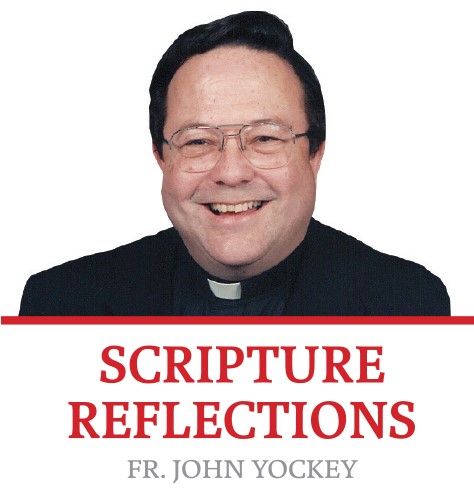FR. JOHN YOCKEY
Acts 2:14, 22-33
1 Peter 1:17-21
Luke 24:13-35
THIRD SUNDAY OF EASTER
Bishop T.D. Jakes, a well-respected Pentecostal pastor, had a busy Monday, March 30. Both Craig Melvin of MSNBC and Neil Cavuto of Fox News had him on their cable talk shows to discuss his faith perspective during the COVID-19 crisis.
He mentioned the awkward feeling Christians faced as we were then looking two weeks ahead. The bishop reassured us not to lose heart because we couldn’t come together for worship on our holiest feast of the year. We often forget a simple fact of history. “The first Easter service wasn’t crowded either. And it didn’t lose its significance for the lack of a crowd.”
Obviously not. No one witnessed the Resurrection event happen.
A number of bystanders had seen Jesus resuscitate the dead Lazarus. John the Evangelist rounded off the Christ’s (the anointed one’s) public ministry with this dramatic account, the most astounding sign of his divine power at work up to that point. (John 11:32-44)
But Lazarus was resuscitated, not resurrected. At Jesus’ command, he walked out of the tomb four days after his death – irretrievably dead in Jewish belief. His bandages were untied. He was reunited with his sisters and friends, and resumed the same everyday living he carried on previously.
By contrast, God the Father resurrected the dead body of his crucified Son. With no one inside the tomb to observe, he raised up Jesus, thoroughly transforming his finite humanity into the infinite glory he shared with the Father before the world began. (John 17:5)
The prophet from Nazareth broke through every limitation of created existence that decisive pre-dawn. His glorified body made him look and act differently than was possible before Calvary.
Luke’s Gospel celebrates an episode later Easter Day. Two confused disciples were comparing notes during their seven-mile walk to Emmaus. A “stranger” approached and joined them. He listened and inquired what they were talking about. They couldn’t believe he didn’t know how upside down things now were in Jerusalem.
“What things?” he asked, and they answered with moving details. The stranger seemed well-schooled and showed how, in fact, their details fulfilled the Hebrew scriptures.
Clearly, he so impressed the two disciples, that they urged him to spend the night with them. Reclining at table for supper, he blessed the bread, broke it and gave it to them. “Their eyes were opened, and they recognized him. And he vanished from their sight.” (Luke 24:31)
They put it together. No wonder their hearts were burning while the “stranger” shared conversation and a friendship meal with them. The encounter energized them to defy the common sense of their culture. They ignored the real threat of bandit assaults on a dark, desert road at night and hurried back to Jerusalem on foot to announce incredibly good news.
No witness was there inside the tomb; yet the empty tomb has empowered countless more persons ever since, usually appreciated only in hindsight.
Christians wouldn’t have survived the crises of their first century, internal as well as external, had Jesus not been walking with them. (Matthew 28:20) Our present scandals are devastating, arguably the worst since the 1500s, but most of Church history has been chaotic. Here we are, nonetheless, able to find renewed hope for the world’s future.
Who’s responsible for our own individual perseverance? What things in our experience prove the honest truth of that classic Broadway tune, “You Never Walk Alone?”
We belong to the Communion of Saints. We feel closer than ever to a loved one who’s died. That nearness is real. Jesus has bridged time and eternity. Treasure any sign, including pain, which speaks to you about someone special. It’s an invitation, a nudge, never an illusion. Your loved one lives on, purified in the Resurrection. Talk things over with them. They care. Listen quietly. You will hear their reply deep in your soul.
And what about places where the secular dominates?
Craig Melvin connected with his guest. “Thirty seconds,” he said hesitating. “I’ve never actually done this on air. Can you lead us in prayer for 30 seconds?”
Bishop Jakes gladly obliged, and his host responded devoutly, Amen. A first for MSNBC.
Thanks to Christ Risen?
For Reflection
- What does Easter mean for you this year?
- How has Jesus touched you through the lockdown?
- Will your faith community ever be the same?
April 23rd, 2020
